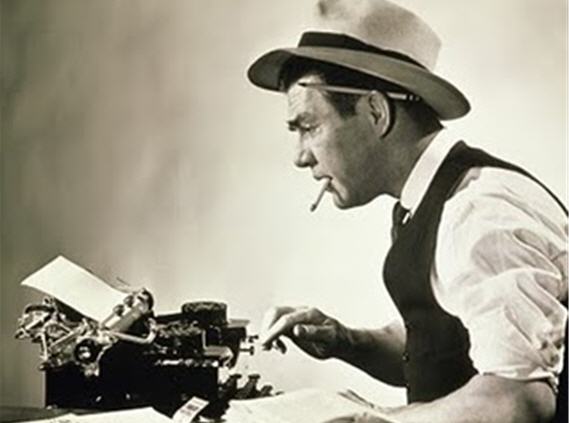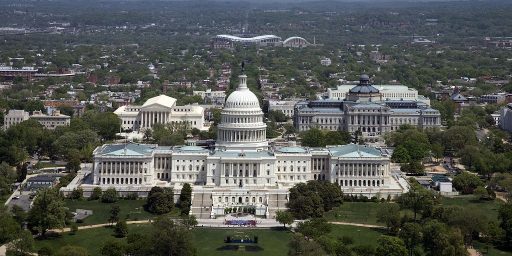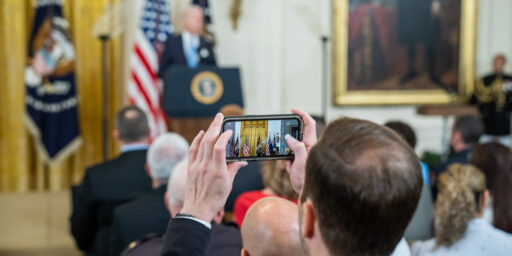Romanticizing Journalism
The combination of Helen Thomas’ forced retirement and news of reporters attending a “beach party” with Joe Biden has culminated in a series of postings around the blogosphere lamenting the sorry state of American journalism.
Balloon Juice‘s mistermix, citing Dana Milbank‘s bittersweet farewell to Thomas, observes,
In the past few years, she functioned as the White House press corps’ token journalist. The supersoakers and tire swingers used Helen’s tough questions as evidence that their institution wasn’t composed entirely of fawning idolaters. Her parting removes one of the last tiny fig leaves covering their gross incompetence.
In a posting titled “Great Moments in Journalistic Hypocrisy,” Jason Sigger observes that Judith Miller has no right to criticize any other journalist for anything.
Turning to “The Biden Beach Party,” attendee Mark Ambinder muses,
Does an afternoon of leisure with senior administration officials violate journalistic ethics? To many, the self-evident answer is: “Absolutely.” I have a different view, although perhaps it’s a way to rationalize my own decision to attend the Bidens’ first beach party for journalists.
In a follow-up, “The Biden Beach Bash and the Ethics of Enjoying an Afternoon,” he explains,
The relationships can be cordial, occasionally cozy, and they can simultaneously be professional and skeptical. Indeed, has there ever been a time when journalists and the political establishment have been MORE skeptical about each other?
In a post derisively titled “Our hard-core, adversarial press corps,” Glenn Greenwald retorts,
I personally don’t think that these types of interactions “violate journalistic ethics” because I don’t think such a thing exists for them. Rather, all of this just helpfully reveals what our nation’s leading “journalists” really are: desperate worshipers of political power who are far more eager to be part of it and to serve it than to act as adversarial checks against it — and who, in fact, are Royal Court Spokespeople regardless of which monarch is ruling. That’s why they’re invited into the heart of Versailles to frolic with the King’s most trusted aides: it’s their reward for loyal service as Court courtiers.
But Ambinder’s former colleague, Matt Yglesias, is more sanguine:
The only non-obvious thing I would add to this is that not only do reporters get captured by their sources, but important officials come to be unduly concerned about the press coverage they get. It’s in the two-way nature of the dysfunctional dynamic that the tempests in teapots that plague the Beltway are born. Reporters spend too much time writing up gossipy items, and public officials spend too much time reading them and courting the press. Everyone would be better off trying to think harder about what’s really important and/or socializing with their actual friends.
Indeed.
But here’s the thing: All this hand-wringing about journalistic standards falling is based on viewing the past through rose-colored glasses. Why, Edward R. Murrow and Walter Cronkite would never have engaged in such tomfoolery!
I can’t speak to those two legendary newsmen specifically but I do know, through even casual reading of history, that their generational cohorts in fact treated politicians with substantially more deference than is the case today.
Reporters and politicians once had a much cozier relationship, with the understanding that virtually everything was off the record. Public officials were entitled to private lives like anyone else and things not specifically related to public policy simply weren’t the people’s business, unless of course the politician benefited from getting the word out about what swell folks they were.
Recall that the journalists of the 1930s and 1940s conspired to hide from the American public the fact that Franklin Roosevelt was confined to a wheelchair. And their 1960s successors didn’t think John Kennedy’s extra-marital affairs counted among all the news that was fit to print.
Do modern day journalists and politicians have a symbiotic relationship? Of course. Do reporters love to rub elbows with the Washington glitterati? You betcha. But it was always thus.
It’s hard to see how it could be otherwise. Effective political reporters require constant access to policymakers. They will naturally develop warm personal relationships with some of their sources and hold others in some contempt, with shades of gray in between. That’s just the nature of human interaction.
Further, as Ambinder notes, reporters — himself included — are probably more cynical than at any point in history. So, too, is the American public.
That’s not surprising. The combination of 24/7 coverage and competition from a vast variety of outlets makes keeping a lid on sordid details next to impossible. Every lie and indiscretion committed by a politician of any significant visibility will inevitably be made public.
Come to think of it, the same is true of slipshod reporting. With an army of bloggers out here dissecting every bit of news coverage, mistakes, sloppiness, deception, and whatnot that would previously have gone unnoticed — or, worse, garnering prestigious prizes — now get exposed almost immediately.
So, no, we don’t need more crabby reporters with chips on their shoulder or a moratorium on water gun fights with Rahm Emanuel.







I’m reading American Lion about the Jackson presidency (yeah, 2 years old. I’m way behind on my reading list). In it, the author describes in depth Jackson’s cozy relationship with certain press functionaries. Or, a more accurate way to describe it, Jackson had a few newspapers that specifically did his bidding and ran what he wanted them to run.
Despite what people on the left yell about Fox news and people on the right yell about–well, all other news–its clearly not as bad today as it was back then. I don’t like seeing a press that is cozy with an administration, but I don’t see Gibbs running his own newspaper.
I would suggest political reporting, with excessive anonymous sourcing and he said/she said formatting, has a lot more problems regarding “objectivity” than whether reporters hang out with Rahm on weekends. I mean, every time I read some political scoop I’m wondering what agenda is being advanced and/or axes being ground by the people doing the leaking… a reporter’s “coziness level” with a source seems a pretty minor thing in that context.
This all may be true of American journalism, but that doesn’t excuse much of it. The Brits still seem to have some journalists who don’t seem to be required to be BFF with whoever’s in power (at least from the short snippets of British interviews I’ve seen).
This is a cultural issue rather than a professional one. British culture is much more comfortable with confrontation than American. Witness, say, Question Time in Parliament or an Oxford debate.
It may be that confrontation is less likely to get you a punch in the snoot there than here.